Introducing Bioethics in Palestine
On Sunday 16 November, the Public Health and Human Rights Centre (PHHRC) at An-Najah National University held its conference titled:”Introducing Bioethics in Palestine”, funded by the Open Society Foundation (OSF).
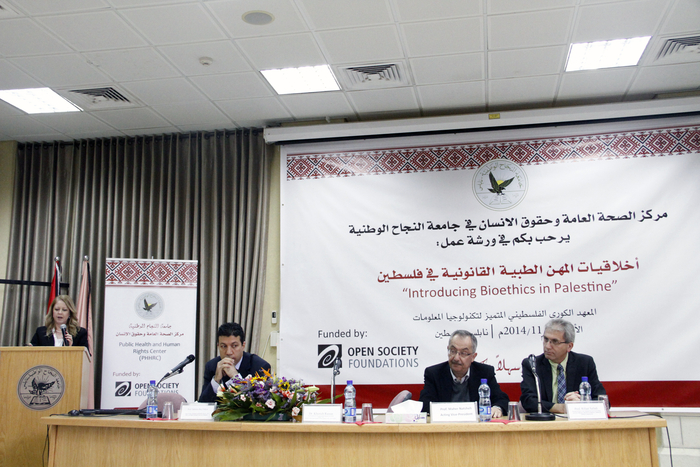
The conference endeavoured to raise awareness of the obstacles to the development of bioethics in Palestine. Most important among these are the absence of strong legal infrastructure, poor awareness among health services of the legal system and laws and principles surrounding health practice, and the inability of community members to distinguish between medical error and medical malpractice.
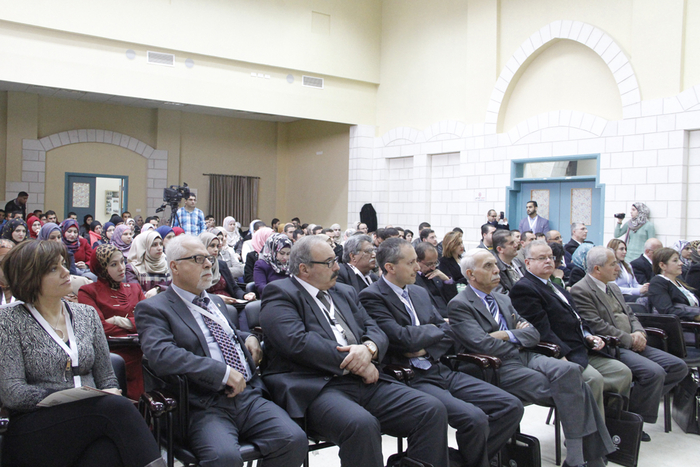
Dr Kherieh Rassas, VP for International Development and External Affairs, Coordinator of the PHHRC and Advisor to the Palestinian Prime Minister, opened the conference speaking about the University’s initiative to establish the Public Health and Human Rights Centre (PHHRC) in 2014, funded by the Open Society Foundation (OSF). This is an initiative that promotes medical law and medical principles, strong relationships between medical staff and patients’ families, information exchange and clarity of the rights, duties and ethics of medical practice in Palestine.
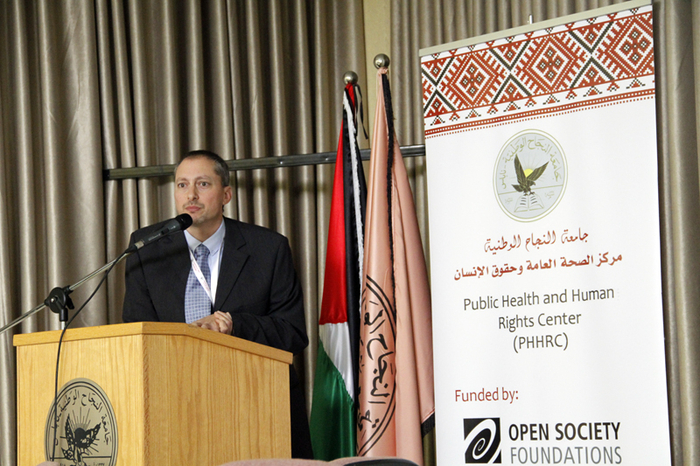
Dr. Rassas added that this centre shall carry out many activities and events that aim at providing the necessary services and information to citizens. In fact, the centre has implemented a series of awareness campaigns targeted at the marginalised communities and students in Palestinian schools and universities.
Professor Saleem Haj-Yahya, Dean of Medicine and Health Sciences and Executive Director of An-Najah Hospital, addressed the application of medical ethics in the treatment of complicated medical cases. He stressed the need to adopt medical ethics to respect patients’ privacy and well-being and achieve greater justice for patients, hospitals and all health service providers. He also called for the implementation of bioethics as he further reviewed the tough choices where doctors have to decide between seeking medical intervention and non-intervention or withdrawal. Prof. Haj-Yahya presented a case study which raises a discussion of the decisions that can determine the fates of patients with complicated cases. In addition, he pointed out the importance of directing more attention to the reporting system of medical problems in order to improve medical service quality.
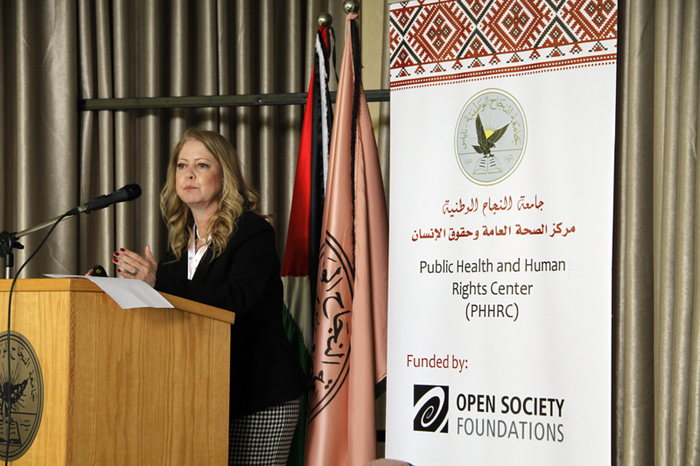
Professor Rif’at Al-Safadi, Hepatologist, presented an introduction to bioethics in North America, Europe and Asia, and the positive threads in patient-doctor relationships. Overall, he emphasised that as humans we must focus on the future in order to survive, and that exchanging expertise in bioethics is essential to this effort.
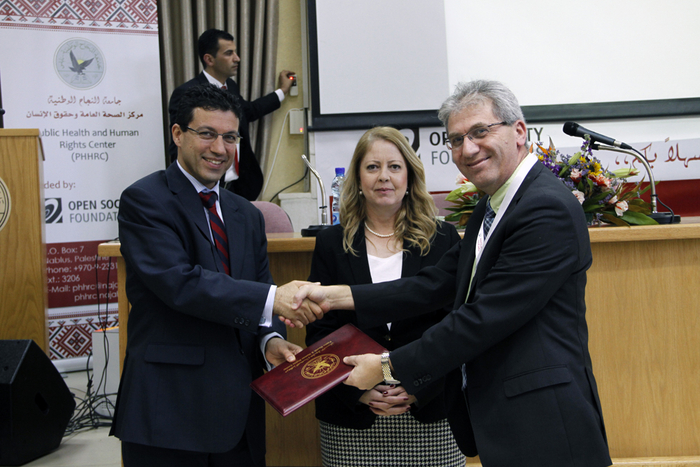
Then Dr Odai Francis, Director of the Intensive Care Unit at Nazareth Hospital, discussed the emergence of the concepts of medical risks and medical problems challenging the United States since the 70s. These resulted in various lawsuits, piling financial burdens on insurance companies and causing them to withdraw from hospitals’ insurance programmes. He also reviewed the possible ways to strengthen medical responsibility, mitigating financial losses in order to maintain hospitals’ resources through rational risk management. In addition, Dr Francis talked about the increasing death rates resulting from medical malpractice in the USA, a result of inaccurate diagnoses and the use of outdated equipment.
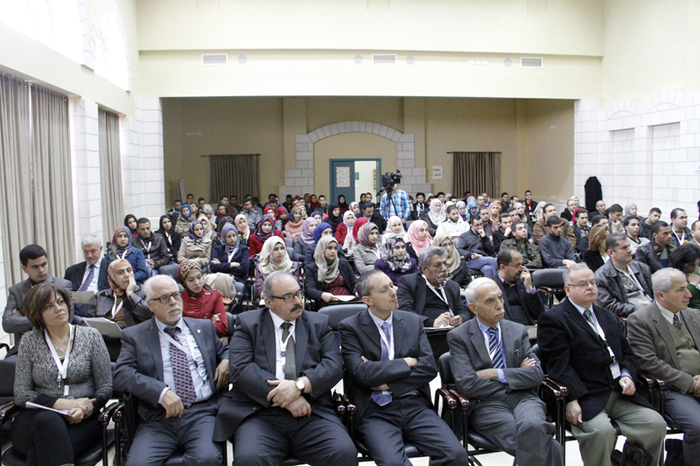
Dr. Rassas then discussed the themes of legal and medical practices, raising a variety of issues relevant to the overlap between these fields. Among these topics were medical issues in relation to legal matters, authorities and responsibilities surrounding medical ethics, medical career development from a legal perspective, the legal relationship between patients and their families, and privacy and medical confidentiality (considered among the most important values to be adhered to in the medical profession). Dr. Rassas also discussed the impact of malpractice on the patient, differences between medical malpractice and negligence and how lack of awareness impacts medical service provision, as well as elements of medical error and the importance of examining these elements accurately, such as duties and powers that must be applied by the book. Finally, she raised the issues of underperformance by medical staff , harm to patients, and the causal elements which must be provided to prove that medical error has occurred.
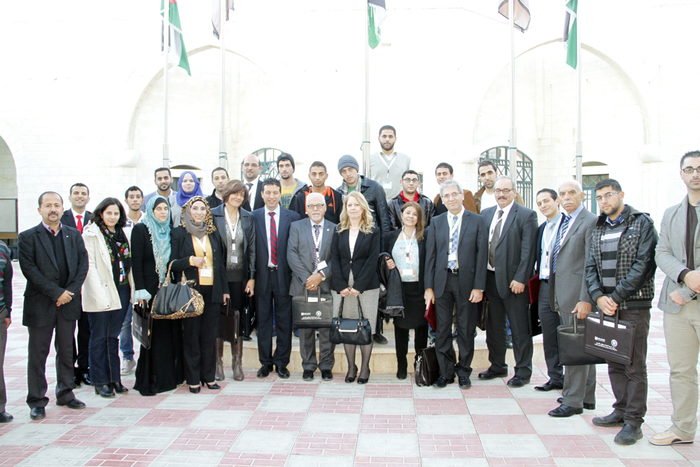
Conference participants also addressed the challenges facing them in developing a medical ethics system. One such challenge involves the issue of conditional consent. Duly signed before entering the operating theatre, conditional consent includes the patient’s signature on an official memo admitting his or her consent to the operation and its consequences. This process is required in order for the patient to recognise the level of danger or success of the surgery; however, there is no law specifying the identity of the person authorised to sign such a letter, and patients' relatives sometimes are able to sign this form in place of the patient. This interferes with the patients' right to avoid procedures to which they do not consent. The participants also pointed out the challenge of developing a more just and equitable relationship between doctor and patient in this conditional consent form.
In addition, conference discussions covered the key pillars of medical ethics represented by medicine, psychology and law. Participants emphasised the importance of understanding these elements accurately and the need to provide adequate health background to health service providers. As well as an understanding of psychology and legal requirements.
The conference aimed at empowering the legal and ethical application of health policies, reinforced with the foundations of a strong relationship between workers and beneficiaries in the health sector. The organisation of this conference is a part of the effort to deepen the practical concepts of medical ethics in day-to-day human life by encouraging ethical behaviour in the arenas of health care, law and social culture. This in turn will have a positive impact on health laws in Palestine, systematic medical policies, and the relationship between the medical team and the patient and his or her family. The long-term effects of these policies will include effective communication between the two parties, reliable information exchange, and clear delineation of the rights, duties, and professional medical ethics for each of them.
Notes:
- The conference was attended by medical specialists, human rights activists and medical students in the university.
- The conference participants also addressed: the lack of legislation and laws that protect doctors, the severe lack of awareness of bioethics principles for medical services providers, whether it be a doctor or a cleaner in the hospital. Furthermore, they discussed medical errors around the world and agreed on the urgency of developing laws and regulations to differentiate between medical errors, which could reasonably occur by mistake during the treatment, and deliberate medical negligence, resulting from negative attitude of the medical service provider which may sometimes lead to undesirable consequences. Moreover, the conference covered the psychological dimension in treating patients according to their health as an indicator of the level of commitment to the medical ethics, and thus the importance of providing appropriate ways to maintain optimal treatment with patients according to their health and local cultures. Participants emphasised the role of this culture in determining the methodology best suited to deal with patients, as customs, traditions and cultures play a major role in deciding on the level of transparency in dealing with the patient and providing him with sufficient information on his state of health. Unlike other countries, this culture is not acceptable as it requires health services providers to take into consideration society systems and norms that allow or prohibit disclosing information to patients of their health status. On the other hand, the speakers emphasised on the importance taking into account the societal and cultural aspects when approving the laws, so that they commensurate with the community customs in the first place.
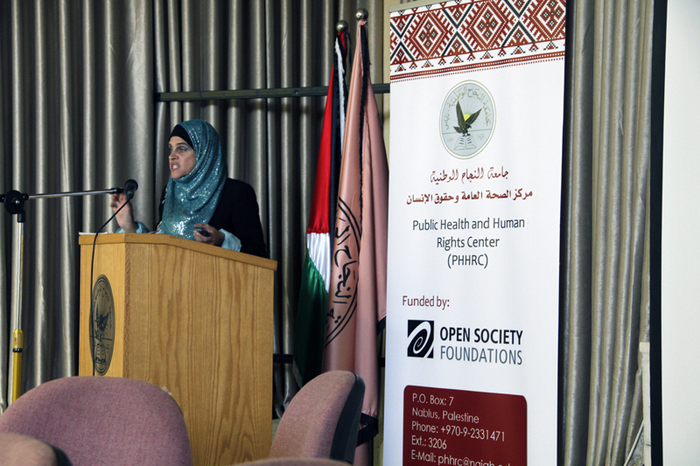
- The conference agenda included 20 presentations and a research paper for distinctive elite group of specialists that touched on the topics of bioethics related to biology and medical sciences, its applications with medical practices, best medical practices, bio-ethics and the business world, pharmacy, medical ethics and the law, and medical ethics to be followed in the intensive care units, clinical death, and the Helsinki School of medical ethics, cultural challenges in the field of medical ethics, and lessons learned from the recent war in Gaza.



